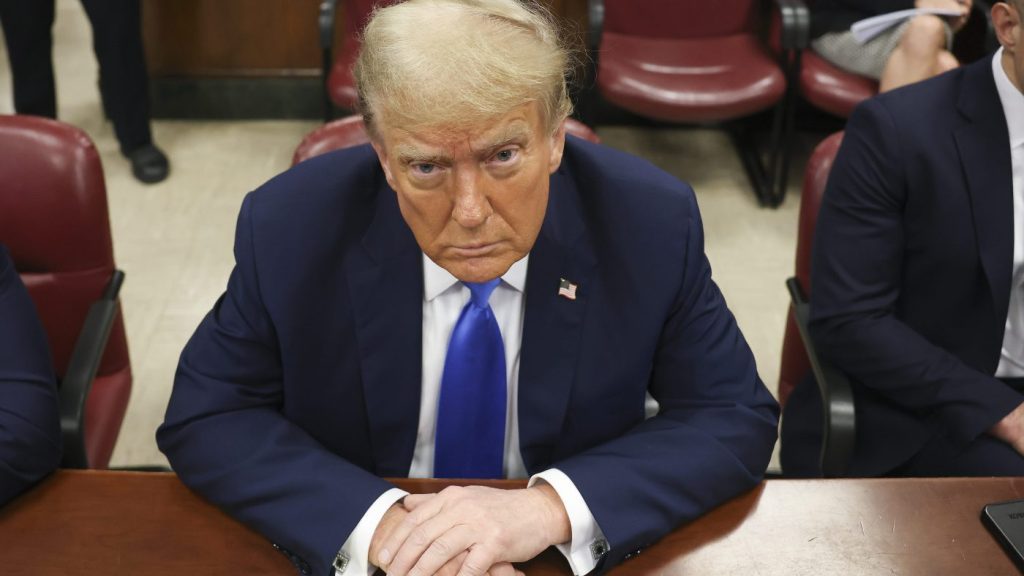The prosecution says they will present evidence to show that Trump was involved in a criminal scheme to manipulate the 2016 election and then tried to hide it. they plan to show this to the New York jury who will decide if Trump should be charged before the Election Day. The Manhattan prosecutor Matthew Colangelo said that the case is about a criminal conspiracy and a cover-up orchestrated by Donald Trump to corrupt the 2016 election.
The prosecutor claimed that Trump put together a plan to corrupt the 2016 election and then tried to cover it up.
Trump's lawyers will argue that what happened was not a crime, but just regular business.
Trump's lawyer Todd Blanche said that Trump is innocent and did not commit any crimes, and that the case should never have been brought.
The opening statements gave a preview of what will be discussed in the Manhattan courtroom during the first criminal trial of a former president.
Trump faces charges of falsifying business records, and prosecutors will try to convince the jury that he covered up a hush money deal to affect the 2016 presidential election.
The district attorney's speech to the jury echoed Trump's other criminal cases involving his alleged attempts to influence the 2020 presidential election results.
The prosecutor called it election fraud during the opening remarks.
Trump stayed calm and wore a pin of an American flag on his blue suit as the statements were made.
Blanche mentioned that hush money alone isn't illegal and compared it to a regular nondisclosure agreement.
He said there's nothing wrong with trying to influence an election because it's part of democracy.
He spent most of his opening statement criticizing the credibility of the expected star witnesses for the prosecution.
Blanche told the jury not to trust Michael Cohen, Trump's former fixer and personal lawyer who made the hush money deals at the center of the case.
Trump's attorney brought up Cohen's past guilty pleas and portrayed him as a liar profiting from attacking Trump.
Blanche said the jury shouldn't rely on the words of Michael Cohen when making a serious decision about President Trump.
He also tried to discredit Stormy Daniels, who is likely to testify about the $130,000 payment she received to keep quiet about an alleged sexual encounter with Trump before the 2016 election.
Blanche tried to separate Daniels from Trump’s case, saying the adult-film star doesn't know about the charges because they are about documents created after Daniels was paid off.
“Her testimony, while scandalous, is not important,” Blanche stated.
Prosecutors tried to improve the image of their star witnesses before they testified — and before the defense tried to discredit them. The state told jurors upfront that Trump tried to “silence” Daniels and that Cohen “made mistakes in the past.”
“You should keep an open mind,” Colangelo advised the jury.
After opening statements, prosecutors called their first witness: David Pecker, the ex-CEO of American Media.
The district attorney’s office described the so-called “catch-and-kill” conspiracy it says underlies the case.
At an August 2015 meeting with Trump and Cohen, Pecker agreed to suppress bad press about Trump. Their effort became more urgent after the now-famous “Access Hollywood” tape surfaced just weeks before Election Day 2016, in which Trump boasts about his apparently unsolicited advances on women.
On the witness stand Monday, Pecker testified that “juicy stories” were run by him before publication and he had final say on what was — or wasn’t — published.
Pecker’s testimony was cut short by time constraints imposed by the judge to honor any Passover commitments and a juror’s dental appointment.
The proceedings are set to resume Tuesday morning, when the judge will consider prosecutors’ assertion that Trump has violated his gag order 10 times. They have requested the judge to hold the former president in contempt and fine him thousands of dollars.
Afterward, Pecker is expected to retake the stand.









